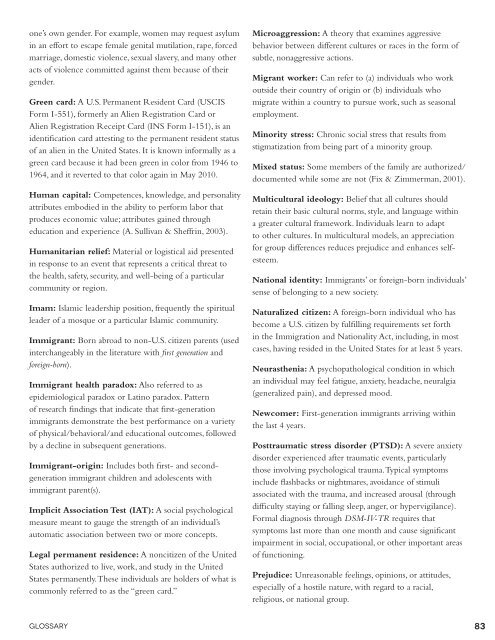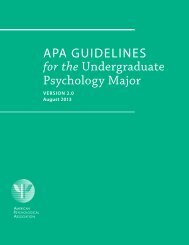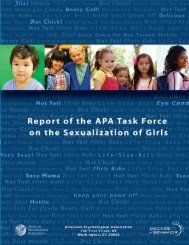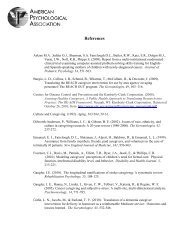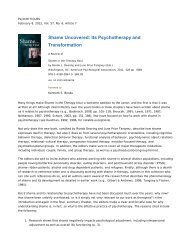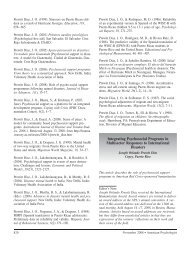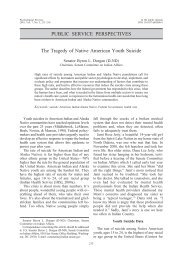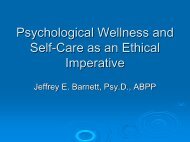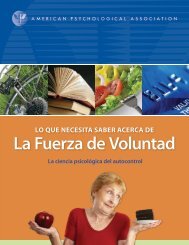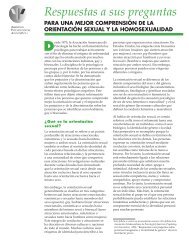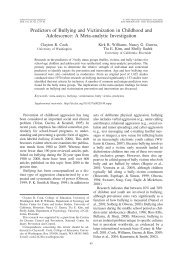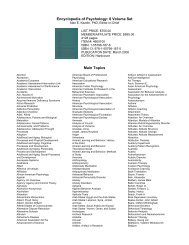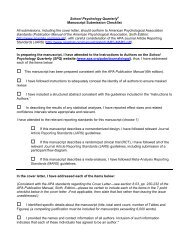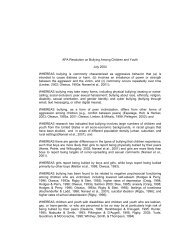Crossroads: The Psychology of Immigration in the New Century
Crossroads: The Psychology of Immigration in the New Century
Crossroads: The Psychology of Immigration in the New Century
You also want an ePaper? Increase the reach of your titles
YUMPU automatically turns print PDFs into web optimized ePapers that Google loves.
one’s own gender. For example, women may request asylum<br />
<strong>in</strong> an effort to escape female genital mutilation, rape, forced<br />
marriage, domestic violence, sexual slavery, and many o<strong>the</strong>r<br />
acts <strong>of</strong> violence committed aga<strong>in</strong>st <strong>the</strong>m because <strong>of</strong> <strong>the</strong>ir<br />
gender.<br />
Green card: A U.S. Permanent Resident Card (USCIS<br />
Form I-551), formerly an Alien Registration Card or<br />
Alien Registration Receipt Card (INS Form I-151), is an<br />
identification card attest<strong>in</strong>g to <strong>the</strong> permanent resident status<br />
<strong>of</strong> an alien <strong>in</strong> <strong>the</strong> United States. It is known <strong>in</strong>formally as a<br />
green card because it had been green <strong>in</strong> color from 1946 to<br />
1964, and it reverted to that color aga<strong>in</strong> <strong>in</strong> May 2010.<br />
Human capital: Competences, knowledge, and personality<br />
attributes embodied <strong>in</strong> <strong>the</strong> ability to perform labor that<br />
produces economic value; attributes ga<strong>in</strong>ed through<br />
education and experience (A. Sullivan & Sheffr<strong>in</strong>, 2003).<br />
Humanitarian relief: Material or logistical aid presented<br />
<strong>in</strong> response to an event that represents a critical threat to<br />
<strong>the</strong> health, safety, security, and well-be<strong>in</strong>g <strong>of</strong> a particular<br />
community or region.<br />
Imam: Islamic leadership position, frequently <strong>the</strong> spiritual<br />
leader <strong>of</strong> a mosque or a particular Islamic community.<br />
Immigrant: Born abroad to non-U.S. citizen parents (used<br />
<strong>in</strong>terchangeably <strong>in</strong> <strong>the</strong> literature with first generation and<br />
foreign-born).<br />
Immigrant health paradox: Also referred to as<br />
epidemiological paradox or Lat<strong>in</strong>o paradox. Pattern<br />
<strong>of</strong> research f<strong>in</strong>d<strong>in</strong>gs that <strong>in</strong>dicate that first-generation<br />
immigrants demonstrate <strong>the</strong> best performance on a variety<br />
<strong>of</strong> physical/behavioral/and educational outcomes, followed<br />
by a decl<strong>in</strong>e <strong>in</strong> subsequent generations.<br />
Immigrant-orig<strong>in</strong>: Includes both first- and secondgeneration<br />
immigrant children and adolescents with<br />
immigrant parent(s).<br />
Implicit Association Test (IAT): A social psychological<br />
measure meant to gauge <strong>the</strong> strength <strong>of</strong> an <strong>in</strong>dividual’s<br />
automatic association between two or more concepts.<br />
Legal permanent residence: A noncitizen <strong>of</strong> <strong>the</strong> United<br />
States authorized to live, work, and study <strong>in</strong> <strong>the</strong> United<br />
States permanently. <strong>The</strong>se <strong>in</strong>dividuals are holders <strong>of</strong> what is<br />
commonly referred to as <strong>the</strong> “green card.”<br />
GLOSSARY<br />
Microaggression: A <strong>the</strong>ory that exam<strong>in</strong>es aggressive<br />
behavior between different cultures or races <strong>in</strong> <strong>the</strong> form <strong>of</strong><br />
subtle, nonaggressive actions.<br />
Migrant worker: Can refer to (a) <strong>in</strong>dividuals who work<br />
outside <strong>the</strong>ir country <strong>of</strong> orig<strong>in</strong> or (b) <strong>in</strong>dividuals who<br />
migrate with<strong>in</strong> a country to pursue work, such as seasonal<br />
employment.<br />
M<strong>in</strong>ority stress: Chronic social stress that results from<br />
stigmatization from be<strong>in</strong>g part <strong>of</strong> a m<strong>in</strong>ority group.<br />
Mixed status: Some members <strong>of</strong> <strong>the</strong> family are authorized/<br />
documented while some are not (Fix & Zimmerman, 2001).<br />
Multicultural ideology: Belief that all cultures should<br />
reta<strong>in</strong> <strong>the</strong>ir basic cultural norms, style, and language with<strong>in</strong><br />
a greater cultural framework. Individuals learn to adapt<br />
to o<strong>the</strong>r cultures. In multicultural models, an appreciation<br />
for group differences reduces prejudice and enhances selfesteem.<br />
National identity: Immigrants’ or foreign-born <strong>in</strong>dividuals’<br />
sense <strong>of</strong> belong<strong>in</strong>g to a new society.<br />
Naturalized citizen: A foreign-born <strong>in</strong>dividual who has<br />
become a U.S. citizen by fulfill<strong>in</strong>g requirements set forth<br />
<strong>in</strong> <strong>the</strong> <strong>Immigration</strong> and Nationality Act, <strong>in</strong>clud<strong>in</strong>g, <strong>in</strong> most<br />
cases, hav<strong>in</strong>g resided <strong>in</strong> <strong>the</strong> United States for at least 5 years.<br />
Neuras<strong>the</strong>nia: A psychopathological condition <strong>in</strong> which<br />
an <strong>in</strong>dividual may feel fatigue, anxiety, headache, neuralgia<br />
(generalized pa<strong>in</strong>), and depressed mood.<br />
<strong>New</strong>comer: First-generation immigrants arriv<strong>in</strong>g with<strong>in</strong><br />
<strong>the</strong> last 4 years.<br />
Posttraumatic stress disorder (PTSD): A severe anxiety<br />
disorder experienced after traumatic events, particularly<br />
those <strong>in</strong>volv<strong>in</strong>g psychological trauma. Typical symptoms<br />
<strong>in</strong>clude flashbacks or nightmares, avoidance <strong>of</strong> stimuli<br />
associated with <strong>the</strong> trauma, and <strong>in</strong>creased arousal (through<br />
difficulty stay<strong>in</strong>g or fall<strong>in</strong>g sleep, anger, or hypervigilance).<br />
Formal diagnosis through DSM-IV-TR requires that<br />
symptoms last more than one month and cause significant<br />
impairment <strong>in</strong> social, occupational, or o<strong>the</strong>r important areas<br />
<strong>of</strong> function<strong>in</strong>g.<br />
Prejudice: Unreasonable feel<strong>in</strong>gs, op<strong>in</strong>ions, or attitudes,<br />
especially <strong>of</strong> a hostile nature, with regard to a racial,<br />
religious, or national group.<br />
83


